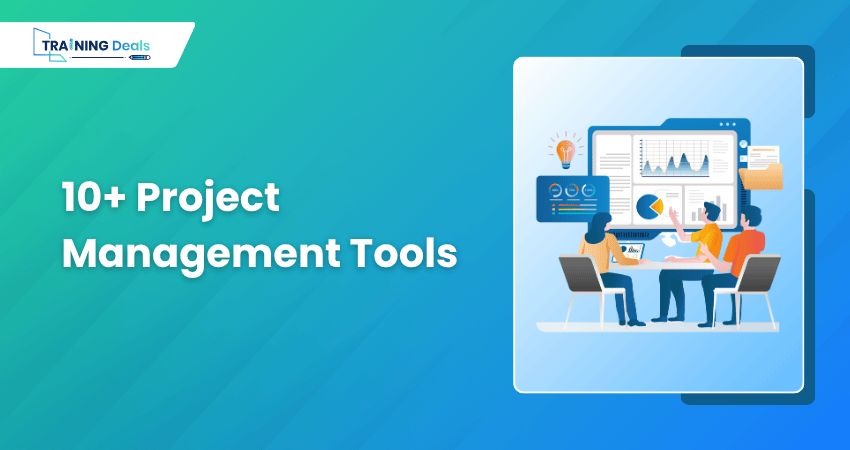
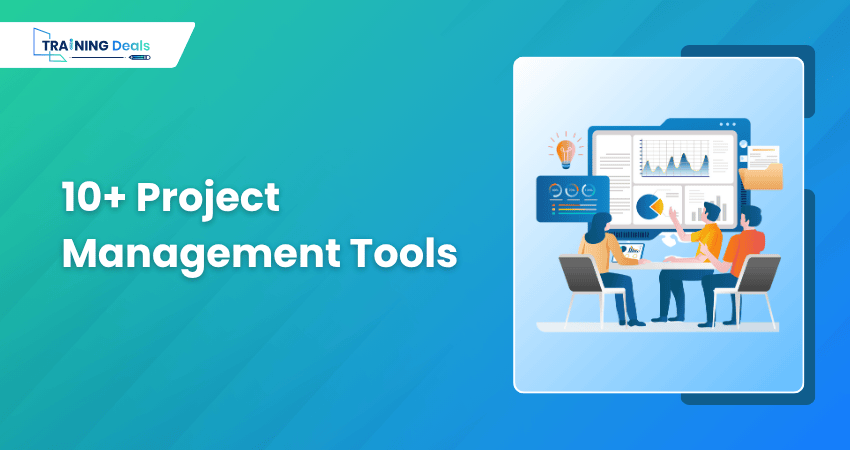
Hailey Davis
In an age of rapid change, the smartest teams are no longer just managing projects. They are mastering them with intelligent tools. Today’s workplaces move faster than ever, with teams spread across cities, time zones, and even continents. Keeping everyone aligned and focused is no small task. That’s why modern Project Management Tools have become the cornerstone of successful teams, helping them stay organised and deliver results on time.
Whether you’re a small startup or a global enterprise, the right Project Management Software can simplify planning and boost overall productivity. If you’re ready to bring such structure to your projects, you’re in the right place. This blog highlights the Top 10+ Project Management Tools that help teams work smarter and efficiently. Let’s dive in!
Table of Contents
1) Best Project Management Tools
a) Wrike
b) Asana
c) Monday.com
d) Jira
e) ClickUp
f) Adobe Workfront
g) Trello
h) Smartsheet
i) Microsoft Planner
j) Zoho Projects
2) Key Factors to Consider When Selecting a Project Management Tool
3) Conclusion
Best Project Management Tools
Project Management Tools are digital platforms that help teams plan, organise, and manage their work effectively. They make it easier to assign tasks, set deadlines, and monitor progress so that projects are completed on time. These tools also help managers see how the team performs in real time.
They promote clear communication and reduce manual effort, enabling teams to collaborate smoothly and complete projects with greater accuracy and speed. Now, let’s explore some of the best Project Management Tools available:
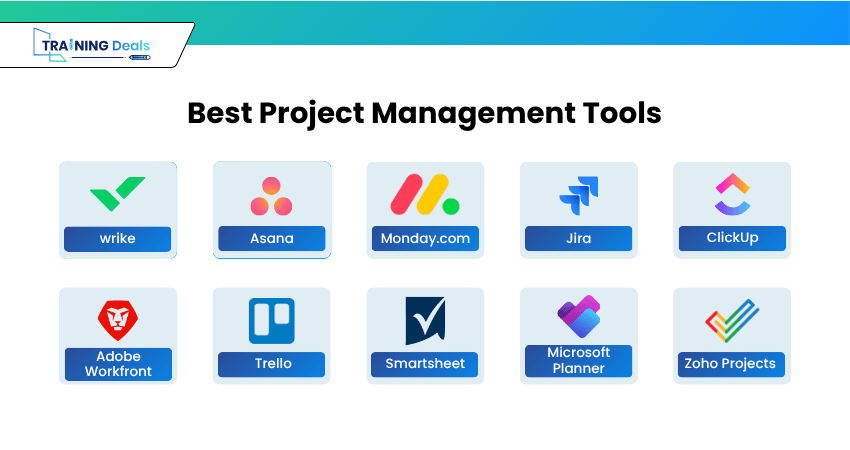
1) Wrike
Wrike is a leading collaborative Project Management tool that offers flexibility for teams of all sizes. It allows users to manage projects, automate tasks, and gain visibility across departments.
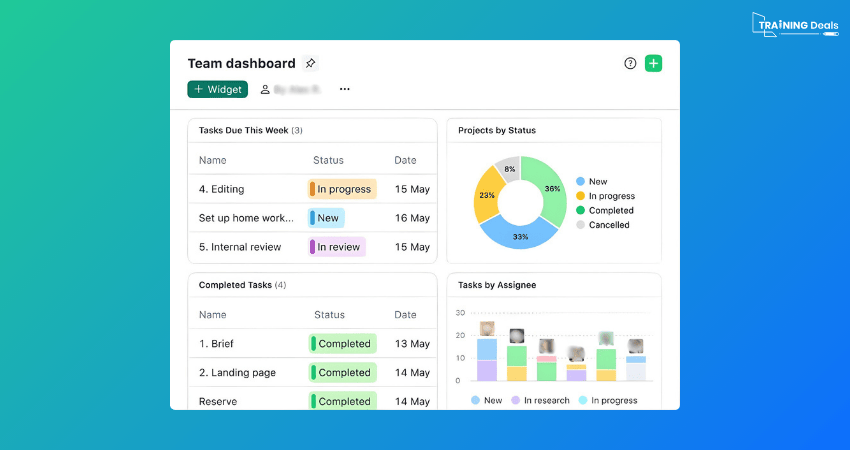
Key Features:
1) AI and Automation: Speeds up work by predicting risks and handling repetitive tasks
2) Visual Collaboration: Includes Klaxoon’s whiteboards and brainstorming tools
3) Real-time Analytics: Tracks workloads and performance instantly
4) Integrations: Connects with more than 400 apps like Teams, Adobe, and Slack
5) Use Case: Ideal for mid-to-large organisations with many concurrent projects and multiple teams.
2) Asana
Asana remains a favourite for teams that want structure and flexibility in one tool. With its clean interface and multiple project views such as boards, lists, and timelines, it helps teams stay organised and focused.
Key Features:
1) Workflow Builder: Let users design visual workflows for task automation
2) Strategic Goals: Aligns team efforts with measurable performance targets
3) Gantt Charts: Provide an attractive visual overview of project timelines
4) Integrations: Works with over 200 apps, including Google Drive, Slack, and Zoom
5) Use Case: Ideal for fast-moving teams like Marketing or Product Development.
3) Monday.com
Monday.com is known for its customisable and engaging dashboard that makes project tracking simple and visual. It offers flexible templates and automation that suit nearly any workflow, from marketing to operations.
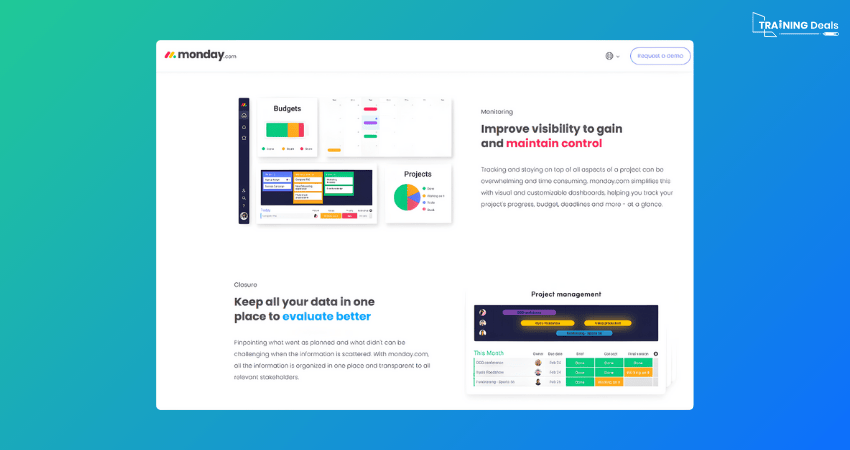
Key Features:
1) Custom Dashboards: Combine project data, deadlines, and budgets in one place
2) Automation: Create custom triggers and reminders to speed up progress
3) Templates: Use 100+ prebuilt templates to start projects quickly
4) Integrations: Compatible with Google Workspace, Slack, and Salesforce
Use Case: Well-suited for small-to-medium teams and for organisations with budget constraints.
4) Jira
Jira is a leading tool for Software Development and Agile Project Management. Originally built for IT and Engineering teams, it now supports cross-functional collaboration through powerful tracking and custom workflows.
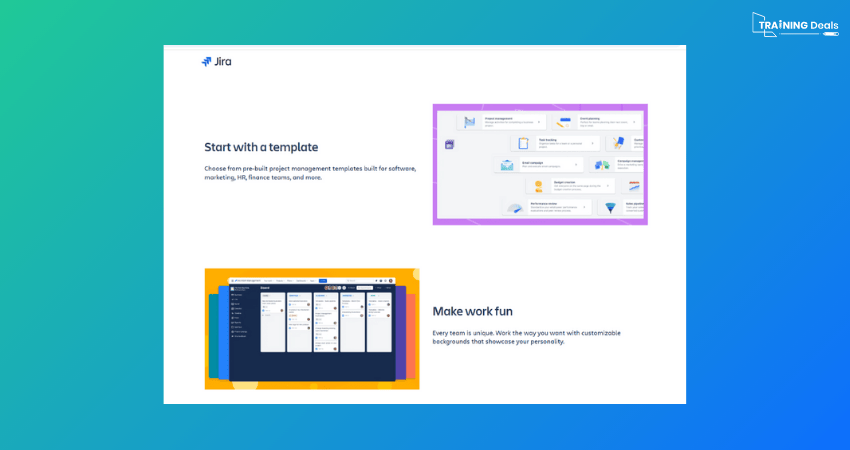
Key Features:
1) Agile Support: Perfect for Scrum, Kanban, and hybrid project setups
2) Custom Workflows: Tailor project tracking and approvals to fit your process
3) Dashboard Views: Track sprints, deadlines, and performance at a glance
4) Integrations: Connects easily with other products like Confluence and Bitbucket
Use Case: Ideal for Agile software and IT teams needing strong issue tracking and code integration.
5) ClickUp
ClickUp is an all-in-one workspace combining Project Management, documentation, goal setting, and communication. It is highly customisable and ideal for teams that want to manage everything from one platform.
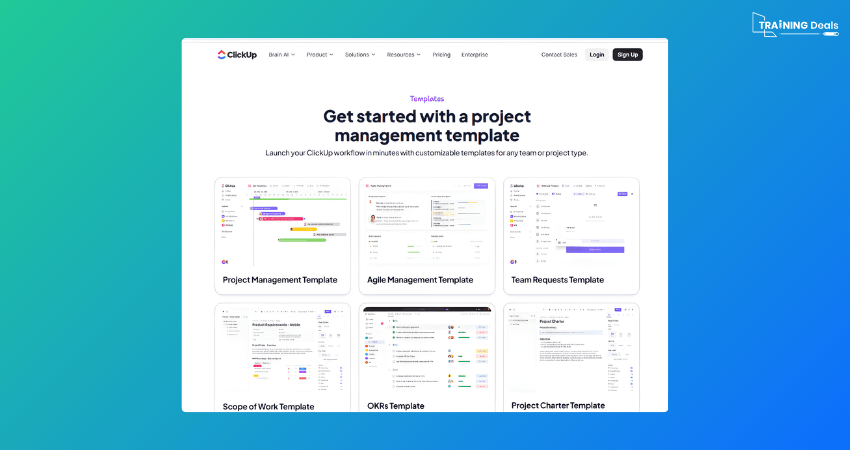
Key Features:
1) Document Hub: Store wikis, internal notes, and FAQs in one place
2) Task Checklists: Break tasks into smaller steps for easier tracking
3) Mind Maps: Visualise goals and dependencies clearly
4) Integrations: Connects with Slack, Google Calendar, Outlook, and more
Use Case: Ideal for startups and growing teams seeking an all-in-one, customisable workspace.
6) Adobe Workfront
Adobe Workfront is designed for large organisations that require enterprise-grade Project Management. It seamlessly connects strategy, execution, and reporting, making it especially useful for marketing and creative teams managing complex workflows.
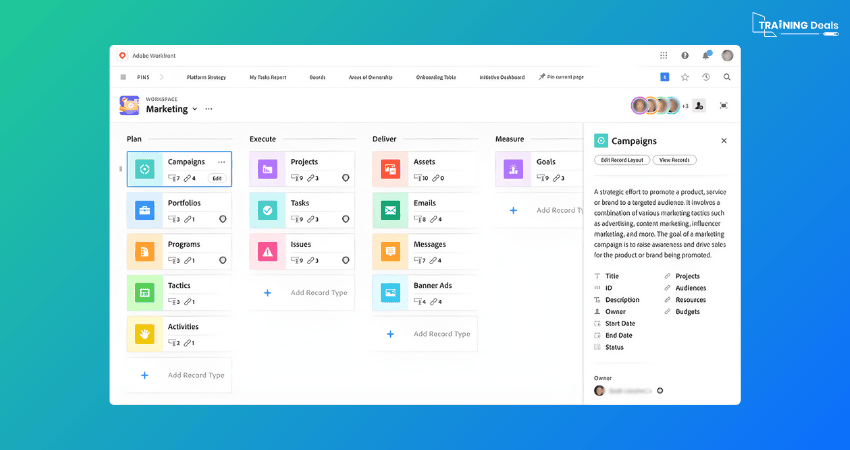
Key Features:
1) Scenario Planner: Helps simulate different outcomes and plan resources
2) Goal Setting: Aligns strategic objectives across departments
3) Advanced Dashboards: Offers deep insights into workflows and team progress
4) Integrations: Seamlessly connects with Adobe Creative Cloud tools
Use Case: Ideal for large enterprises using Adobe tools to manage complex, cross-functional projects.
7) Trello
Trello is one of the simplest yet most effective visual Project Management Tools available. Using its Kanban-style boards, teams can easily track progress, assign tasks, and collaborate in real time. Its clean layout and minimal learning curve make it a top choice for teams of all sizes.
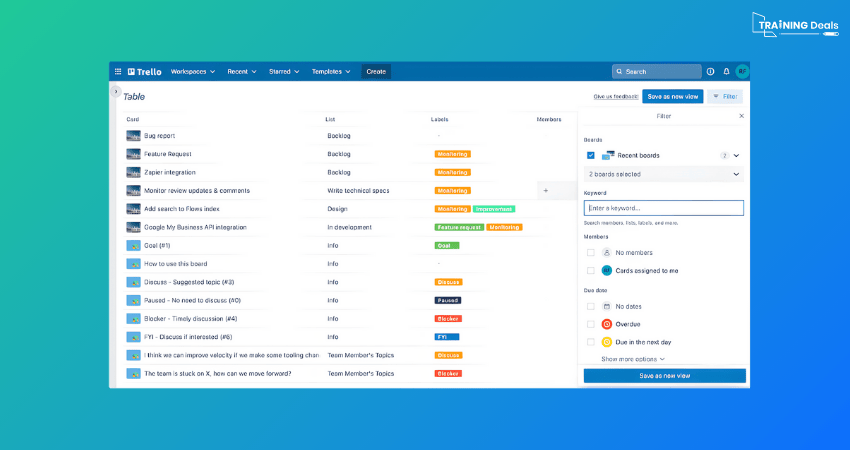
Key Features:
1) Kanban Boards: Visual, drag-and-drop Task Management
2) Custom Cards: Add checklists, comments, and attachments easily
3) Workflow Automation: Automate task movement and reminders
4) Integrations: Offers 200+ app connections, including Google Drive and Slack
Use Case: Ideal for freelancers and small creative teams managing simple projects.
8) Smartsheet
Smartsheet is ideal for teams that prefer a spreadsheet-style interface but want the power of advanced Project Management features. It is highly customisable and perfect for data-driven teams. With tools for Resource Management, dashboards, and real time project tracking, it enhances collaboration and overall flexibility.
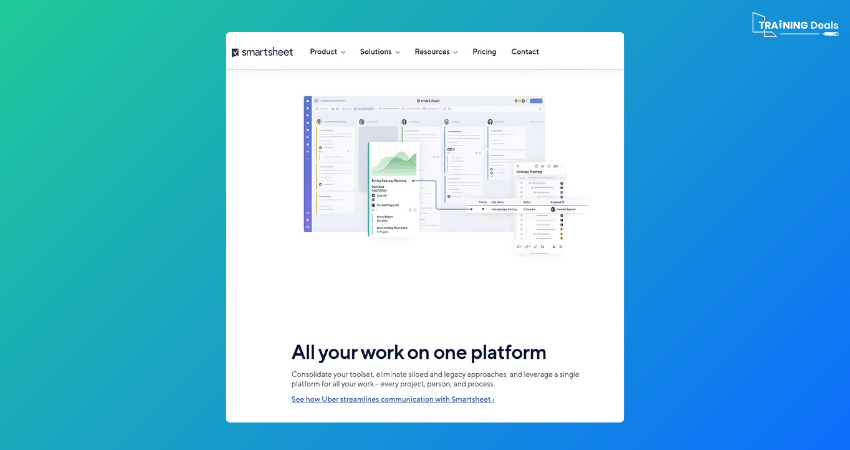
Key Features:
1) Automated Workflows: Streamline repetitive processes using templates and rules
2) Content Management: Manage dashboards, reports, and resources efficiently
3) Data Visualisation: Convert complex data into easy-to-read charts and reports
4) Integrations: Works with 100+ apps, including Slack and Google Workspace
Use Case: Ideal for teams used to spreadsheets, like operations or planning, seeking structured Project Management.
9) Microsoft Planner
After merging with Microsoft Project in 2025, Microsoft Planner continues to be a strong choice for detailed scheduling and resource planning. It is best for structured, waterfall-based projects. You can create tasks, assign responsibilities, and monitor progress across shared boards.
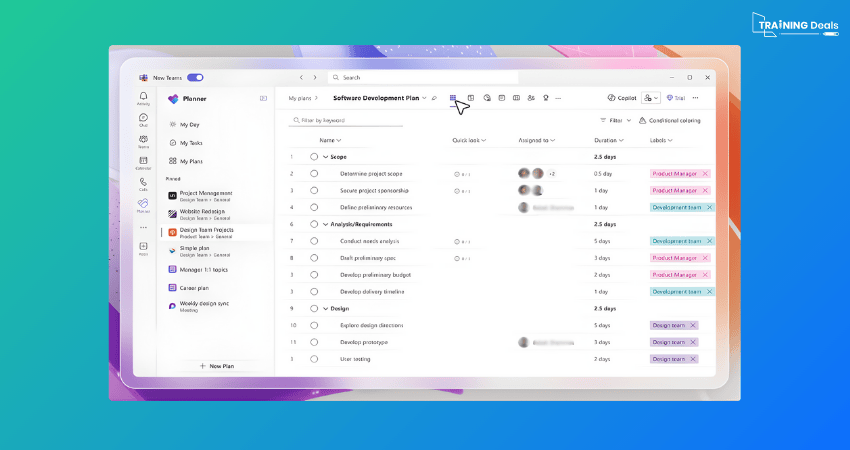
Key Features:
1) Advanced Scheduling: Includes Gantt charts and dependency mapping
2) Resource Management: Tracks team capacity and workload efficiently
3) Microsoft Integration: Seamlessly connects with Teams and Outlook
4) Detailed Reporting: Ideal for large, data-heavy projects
Use Case: Ideal for Microsoft 365 users needing a simple, integrated Project Management Tool.
10) Zoho Projects
Zoho Projects balances affordability and functionality, offering everything from task tracking to reporting. It is a part of the Zoho ecosystem, making it a great fit for businesses already using Zoho tools. It offers task automation, Gantt charts, and issue tracking within an easy-to-navigate interface.
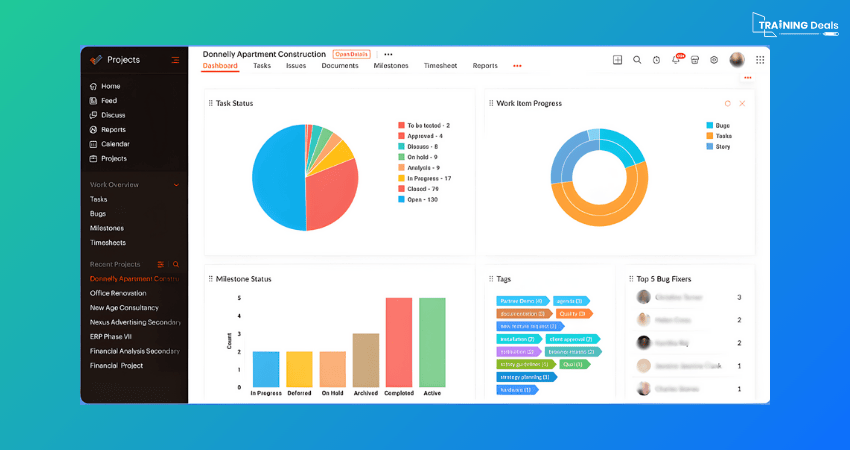
Key Features:
1) Task Management: Includes milestones, dependencies, and recurring tasks
2) Time and Issue Tracking: Built-in timesheets and Bug Management
3) Flexible Views: Choose between Gantt charts or Kanban boards
4) Zoho Integration: Connects with Zoho CRM, Books, and Desk
Use Case: Ideal for small businesses using Zoho, seeking an affordable, capable project tool.
11) Notion
Notion has evolved from a simple note-taking app to a powerful Project Management and collaboration platform. It combines documents, databases, and task management in a single, customisable workspace. You can build your own dashboards and track progress with Notion.
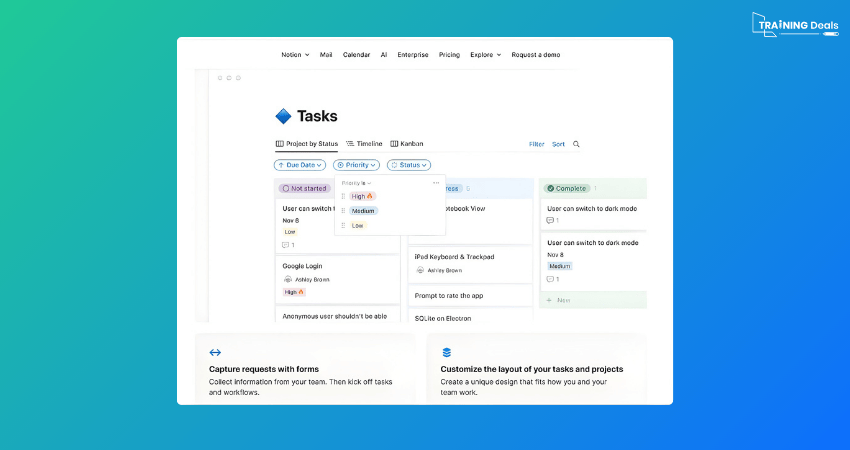
Key Features:
1) Modular Workspace: Create custom pages using text, databases, or calendars
2) Databases: View projects as boards, lists, or timelines
3) Linked Documents: Connect notes and tasks in one workspace
4) Collaboration: Real-time editing, comments, and mentions
Use Case: Ideal for startups and creative teams managing tasks, documents, and wikis in one place.
Key Factors to Consider When Selecting a Project Management Tool
Choosing the right Project Management Tool can make your team’s work smoother and more organised. Below are some key factors to consider before making a decision:
1) User Capacity
Start by assessing how many people will use the tool. Smaller teams may need something simple with task lists and timelines, while bigger companies might need advanced features for reporting and Resource Management.
2) Scalability
A good Project Management Tool should grow with your organisation. Even if your team is small today, choose a platform that can handle more users, projects, and complex workflows in the future. This means you won’t have to switch to a new system later.
3) Pricing Model
Check if the pricing of the Project Management Tool fits your budget. Many tools offer free trials or basic versions, so you can test them first. Consider whether features like automation, advanced reporting, or integrations are included in the base plan or require upgrades.
4) User-friendliness
Ease of use plays a major role in tool adoption. Even the most feature-rich software is ineffective if your team struggles to use it. Look for tools with intuitive interfaces, minimal setup requirements, and comprehensive support resources.
5) Essential Features
Every team operates differently. So, you need to choose the features that solve your real problems. If you need better teamwork, choose tools with built-in chat and real-time updates. If your work is more technical, look for automation, Gantt charts, and Workload Management.
Conclusion
The future of work is all about smarter collaboration, and Project Management Tools are at the heart of that change. They bring structure to ideas, turn goals into action, and help teams stay connected no matter where they work from. With the right tool, productivity isn’t just about doing more. It is about working better together.





















